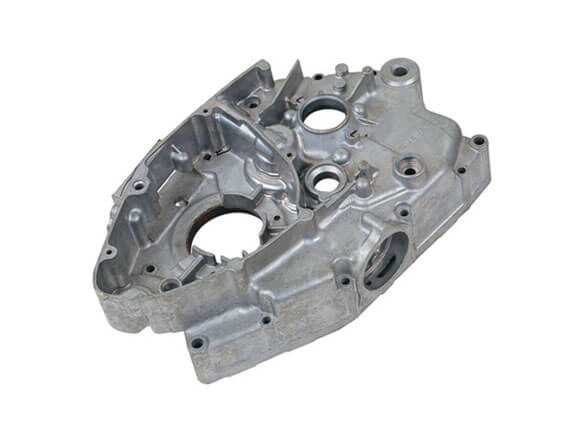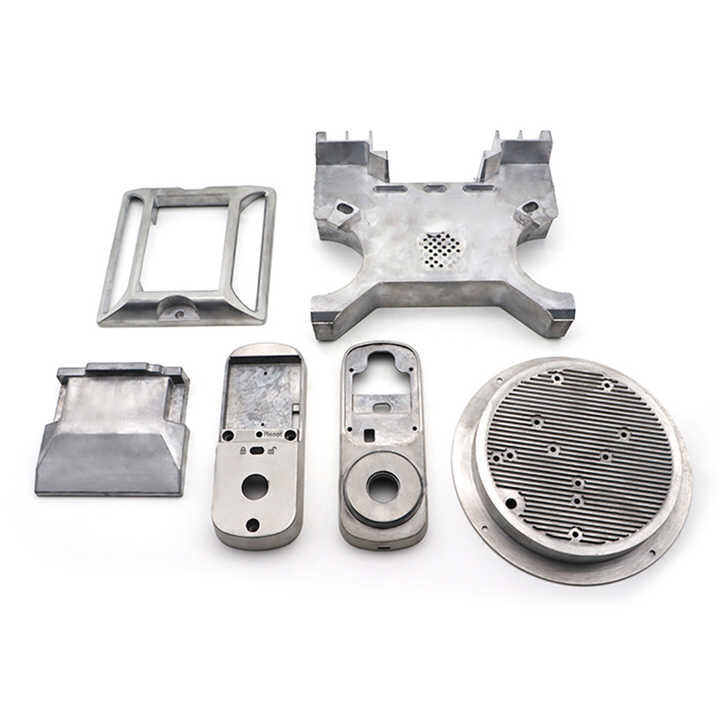How aluminum casting improves manufacturing efficiency
Wiki Article
Exactly How Light Weight Aluminum Casting Contributes to Reliable Manufacturing Solutions
Light weight aluminum spreading plays an important duty in contemporary manufacturing. Its lightweight nature and corrosion resistance make it a recommended selection for various industries. Methods such as die spreading and sand casting permit the creation of complex get rid of minimal waste. The combination of automation more enhances manufacturing effectiveness. Nevertheless, the implications of these developments prolong past plain efficiency. Comprehending the broader effect discloses considerable understandings into the future of manufacturingThe Advantages of Light Weight Aluminum in Production
Although different steels are utilized in manufacturing, aluminum stands out because of its one-of-a-kind residential or commercial properties that improve production effectiveness and item performance. Its light-weight nature significantly reduces transportation costs and energy demands in different applications. Light weight aluminum's excellent corrosion resistance warranties long life and sturdiness, decreasing the need for frequent substitutes and upkeep. This metal can be quickly molded and formed, enabling flexible design options that meet specific industry needs. On top of that, light weight aluminum displays exceptional thermal and electric conductivity, making it an optimal option for applications requiring effective heat dissipation and electric administration. The recyclability of aluminum likewise plays an important role in sustainable manufacturing practices, as it can be reused without losing its fundamental residential or commercial properties. Overall, the advantages of aluminum in manufacturing lead to cost financial savings, improved product longevity, and a reduced ecological impact, making it a preferred product in countless sectors.Trick Light Weight Aluminum Spreading Techniques
Light weight aluminum casting strategies are necessary for generating top notch elements in different manufacturing procedures. The primary techniques include sand spreading, die spreading, and financial investment spreading. Sand casting involves developing a mold from sand, which permits for complex shapes and big elements. This strategy is usually favored for its cost-effectiveness and convenience. Pass away casting, on the various other hand, uses high-pressure to infuse liquified aluminum into steel mold and mildews, resulting in precise, uniform parts appropriate for high-volume manufacturing. Financial investment spreading offers exceptional surface area finish and complex information by making use of a wax pattern that is disappeared to form the mold. Each of these strategies has certain applications and advantages, enabling manufacturers to pick the most suitable technique based upon factors like manufacturing complexity, quantity, and product specs. By understanding these vital methods, suppliers can enhance their production effectiveness and ensure the integrity of their aluminum elements.Effect On Automotive Sector
As the vehicle industry progressively prioritizes light-weight products to improve fuel effectiveness and performance, light weight aluminum spreading has become an essential remedy. This production process permits automakers to generate complex components with reduced weight without jeopardizing structural stability. By utilizing light weight aluminum spreading, producers can create components such as engine blocks, transmission real estates, and suspension components that are not just lighter but additionally exhibit outstanding thermal conductivity and corrosion resistance.In addition, the adaptability of light weight aluminum spreading strategies enables the manufacturing of elaborate styles, helping with innovation in car appearances and capability. As cars become extra technologically progressed, the capacity to integrate attributes like innovative safety and security systems and electrical drivetrains comes to be vital.

Aerospace Applications of Aluminum Casting
Aluminum spreading plays a vital duty in aerospace applications by allowing the manufacturing of light-weight structural parts that enhance gas efficiency. In addition, the accuracy of aluminum spreading permits the production of elaborate engine components, which are necessary for peak performance and integrity. This combination of light-weight products and accurate engineering positions aluminum spreading as a vital modern technology in the aerospace market.Lightweight Structural Elements
In the pursuit for boosted efficiency and effectiveness in aerospace applications, lightweight architectural elements have actually become significantly important. Light weight aluminum casting plays a critical duty in this undertaking, providing manufacturers with the capacity to generate components that are both strong and lightweight. The low thickness of aluminum permits considerable weight reductions without jeopardizing architectural integrity, which is essential for airplane performance and fuel performance. Furthermore, light weight aluminum spreadings can be engineered to fulfill particular design demands, allowing the creation of intricate geometries that conventional manufacturing approaches might struggle to achieve. This convenience not only simplifies manufacturing processes but likewise adds to total expense financial savings. As the aerospace sector continues to emphasize sustainability, the need for lightweight light weight aluminum elements is expected to increase, even more advancing advancement in manufacturing.Accuracy Engine Components
Producers significantly rely on light weight aluminum casting to generate precision engine components for aerospace applications, driven by the material's one-of-a-kind properties. Light weight aluminum's light-weight nature significantly lowers overall airplane weight, enhancing fuel effectiveness and efficiency. Its exceptional rust resistance warranties long life in extreme atmospheres, making it optimal for crucial engine components. Furthermore, aluminum spreading enables detailed designs and tight tolerances, crucial for maximizing engine efficiency and integrity. The spreading procedure additionally supports automation, making it possible for manufacturers to meet high need while maintaining top quality standards. As aerospace innovation remains to breakthrough, the duty of light weight aluminum casting in developing accuracy engine parts will be crucial in attaining higher efficiency and advancement in airplane style and performance.Sustainability and Ecological Advantages
The expanding focus on sustainability in production has actually positioned aluminum casting as a leading option for environmentally conscious production. This process utilizes recycled aluminum, which significantly decreases energy usage compared to primary aluminum production. By leveraging scrap metal, makers can decrease their carbon impact and reduce waste, lining up with global sustainability objectives.In addition, light weight aluminum spreading creates less harmful exhausts, adding to a cleaner atmosphere. The light-weight nature of aluminum also boosts fuel performance in transport applications, additionally promoting eco-friendly techniques.
The longevity and deterioration resistance of aluminum lead to longer product life-spans, decreasing the need for constant replacements and saving resources. As markets increasingly focus on lasting options, aluminum spreading attracts attention as an innovative approach that not only satisfies production demands yet likewise supports ecological stewardship. This dedication to sustainability settings light weight aluminum spreading as a critical gamer in the shift towards a greener manufacturing landscape.
Price Performance in Production
Expense performance is a significant advantage of light weight aluminum spreading, matching its sustainability benefits - Precision aluminum casting. The procedure of aluminum spreading permits the production of complicated shapes with marginal waste, which is especially vital in an affordable manufacturing atmosphere. Using light weight aluminum lowers energy prices, as it has a reduced melting point compared to various other metals, bring about reduced power usage throughout manufacturingAdditionally, light weight aluminum's light-weight homes add to lower delivery and taking care of costs, even more improving total cost efficiency. The durability and rust resistance of aluminum cast products also suggest that they require less upkeep and substitute in time, resulting in long-term cost savings for producers.
Developments in casting technologies, such as enhanced mold layouts and automation, have streamlined manufacturing procedures, lowering labor prices and raising outcome effectiveness. In general, expense efficiency in light weight aluminum casting plays an essential function in enhancing manufacturing operations and sustaining competitive rates strategies.
Future Fads in Aluminum Casting
The future of light weight aluminum casting is increasingly formed by improvements in automation and lasting material innovations. Automation innovations are expected to enhance performance and precision in the spreading process, while lasting methods aim to lower ecological effect. With each other, these trends promise to redefine production standards and techniques within the light weight aluminum casting industry.Automation in Light Weight Aluminum Spreading
Accepting automation is changing aluminum casting processes, leading the way for improved efficiency and accuracy. Automated systems simplify manufacturing by decreasing human intervention, minimizing errors, and enhancing throughput. Technologies such as robot arms and computer system mathematical control (CNC) machines enable precise and regular shaping of aluminum parts. Furthermore, wise sensors check numerous criteria in genuine time, guaranteeing optimal problems throughout the casting process. This integration of automation not just reduces preparations yet additionally enhances product quality by maintaining tighter resistances. As manufacturers increasingly adopt these advanced innovations, the aluminum casting industry is readied to experience substantial improvements in operational efficiency, cost-effectiveness, and competition in the global market.Sustainable Product Innovations

Regularly Asked Concerns
What Types of Light Weight Aluminum Alloys Are Commonly Utilized in Spreading?
Generally used aluminum alloys in casting include 356, 380, and 413. These alloys are favored for their exceptional fluidity, stamina, and deterioration resistance, making them suitable for a range of industrial applications.Exactly How Does Light Weight Aluminum Casting Compare to Other Steel Spreading Methods?
Aluminum casting normally offers lower weight, premium corrosion resistance, and better thermal conductivity compared to various other steel spreading methods. In addition, it enables for intricate styles and faster production cycles, boosting overall manufacturing efficiency and performance.What Industries Advantage The Majority Of From Light Weight Aluminum Spreading?
The automotive, aerospace, and electronics sectors benefit most from aluminum casting. These industries use its light-weight, corrosion-resistant residential properties to boost performance, decrease fuel usage, and improve general product effectiveness, making light weight aluminum casting increasingly important.Exist Certain Layout Limitations With Light Weight Aluminum Spreading?
Yes, aluminum spreading has design restrictions, consisting of constraints on wall surface thickness, complicated geometry difficulties, and potential concerns with attaining tight tolerances (Precision aluminum casting). These factors can influence the total stamina and check here performance of the last productJust How Is Quality Control Maintained in Aluminum Spreading Processes?
Quality assurance in light weight aluminum casting procedures is preserved with rigorous assessments, adherence to standardized procedures, and making use of sophisticated modern technologies. Normal monitoring guarantees dimensional precision, surface integrity, and product consistency throughout manufacturing, advertising total dependability.As the automotive sector significantly prioritizes light-weight materials to enhance fuel effectiveness and performance, light weight aluminum casting has actually emerged as a crucial service. Aluminum casting plays an essential function in aerospace applications by enabling the production of lightweight architectural components that boost fuel performance. Expense performance is a substantial advantage of aluminum casting, enhancing its sustainability benefits. Accepting automation is changing light weight aluminum spreading procedures, leading the means for improved effectiveness and precision. Recycled light weight aluminum use has gained grip, significantly reducing power intake compared to key aluminum production.
Report this wiki page